It is always important to consider the context and the relationship to the other person when using such expressions. Of course, there are also more intense forms like "Ich liebe dich", but the above can also be used for regular friends and not only for a partner.
- „Hab dich lieb.“
- „Mag dich voll.“
- „Du bist mir wichtig!“
- „Du bist mir ans Herz gewachsen!“
- „Du bedeutest mir viel!“
- „Bist 'n Guter! / Du bist ne Gute!“
- „Du bist echt klasse!“
- „Du bist echt ein Schatz!“
- „Mit dir kann man Pferde stehlen!“
- „Ich steh’ auf dich!“
- „Du bist der Hammer!“
- „Ohne dich wär's nur halb so schön!“
- „Du machst mich glücklich!“
- „Du bist mein Lieblingsmensch!“
- „Mit dir ist alles besser!“
- „Ich habe dich ins Herz geschlossen!“
Real examples of colloquial language:
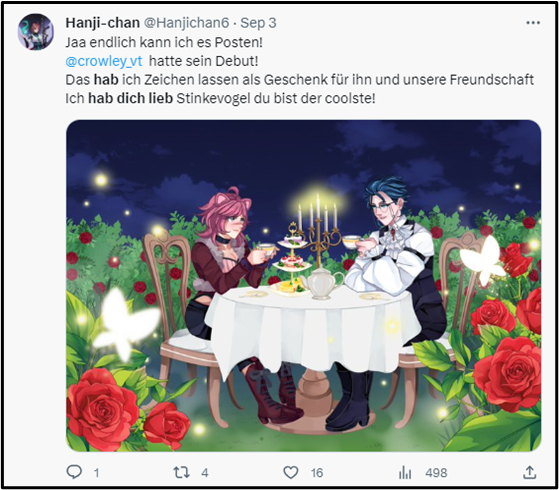
Yes, finally I can post it!
@crowley_vt had his debut!
I left that sign as a gift for him and our friendship.
I love you stinky bird, you're the coolest!
„Hab dich lieb“ is a commonly used phrase in German to express affection towards family, friends, or a partner. It can stand for less intense emotions than an "I love you," but it is still a strong commitment to another person.
Here are some examples of when you might say „Hab dich lieb“:
- Towards family members, to express connectivity and familial love:
„Mach’s gut, Mama. Hab dich lieb." - With friends, as a sign of close friendship:
„Du bist wirklich toll. Hab dich lieb!" - In a romantic relationship, possibly when the relationship is still new or when "I love you" feels too strong:
„Ich gehe jetzt schlafen. Hab dich lieb!" - As a farewell, when you want to show someone that they are important to you:
„Bis bald! Hab dich lieb." - In messages as a sign of care and appreciation:
„Danke für dein offenes Ohr heute. Hab dich lieb." - With comforting words, to express support and emotional support:
„Ich bin immer für dich da, hab dich lieb."
„Hab dich lieb“ can be used at various emotional levels and depths of relationship. It is a versatile phrase that is appropriate in many contexts.
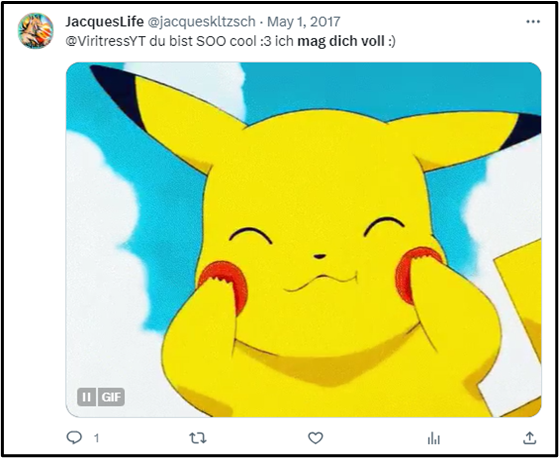
@ViritressYT you are SOO cool.. I really like you 🙂
The phrase „Mag dich voll!“ is a colloquial German phrase used to express sympathy or strong feelings of friendship to someone. This phrasing is less intense than „Hab dich lieb“ and much more casual. It is typically used in informal contexts, often among younger people or in relaxed, friendly relationships.
Here are some examples of using „Mag dich voll".
- As an expression of sympathy towards a friend:
„Du bist immer so lustig, mag dich voll!" - As a response to a kind gesture or gift:
„Oh, das hast du für mich gemacht? Mag dich voll!" - In a moment of gratitude to show appreciation:
„Danke, dass du mir geholfen hast. Mag dich voll!" - Responding to compliments or positive behaviors:
„Das ist so cool, was du da sagst. Mag dich voll!" - At the farewell after a pleasant meeting or experience:
„War echt ein super Tag mit dir, mag dich voll!" - In social media or in text messages as an uncomplicated expression of affection:
„Dein neues Foto ist super! Mag dich voll!"
This expression is typical of a friendly connection and often expresses a spontaneous, casual appreciation, without deeper romantic implications.

To special people I always say, „Du bist mir wichtig!“ That means: You are important to me and I couldn't bear it if something happened to you.
The statement „Du bist mir wichtig!“ is used in German to convey that someone has a significant place in the speaker's life. This phrase reflects a deeper feeling of appreciation and connectivity and goes beyond superficial friendship or acquaintance.
Here are a few examples:
- In a serious conversation to emphasize the deep meaning of a person to oneself:
„Ich möchte, dass du weißt, dass du mir wirklich wichtig bist." - As a response to a possible uncertainty of the other person regarding their own importance:
„Glaube nicht, dass das nicht so ist – du bist mir wichtig!" - When clarifying one's own feelings in an interpersonal relationship:
„Vielleicht habe ich es nicht oft genug gesagt, aber du bist mir wichtig." - As part of an apology to emphasize the weight of one's feelings:
„Es tut mir leid, dass ich dich verletzt habe. Du bist mir wichtig." - When one wishes to express support and loyalty:
„Egal, was passiert, ich bin für dich da, denn du bist mir wichtig."
This phrase is often used in emotionally significant situations and indicates a strong commitment to the other person. It could be used among friends, family members, or partners to communicate their importance.
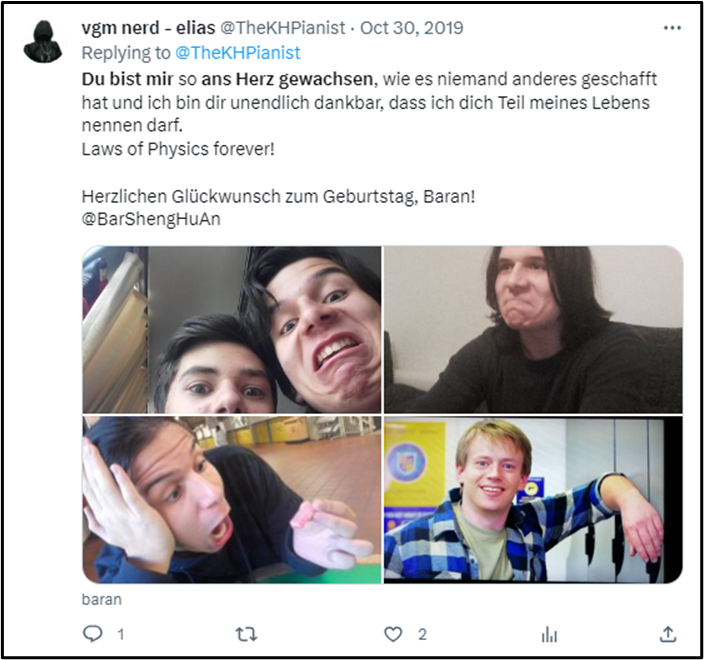
You have grown close to my heart in a way that no one else has and I am eternally grateful that I can call you part of my life. Laws of Physics forever!
Happy birthday, Baran!
@BarShengHuAn
The phrase „Du bist mir ans Herz gewachsen!“ is used in the German language to express that one has developed deep affection and connection for someone over time. It implies that the relationship has gained significance, often through shared experiences or emotional closeness.
Here are examples of using this phrase:
- Towards a friend who has not been seen for a long time and who has been greatly missed:
„Es war so lange still ohne dich – du bist mir echt ans Herz gewachsen!" - In a relationship with a colleague who was initially only a work contact but has now become a friend:
„Wir haben an so lange zusammengearbeitet. Du bist mir ans Herz gewachsen." - As a compliment to someone who might initially have been difficult to figure out but is now greatly appreciated:
„Ich habe anfangs nicht gedacht, dass wir uns so gut verstehen würden. Du bist mir wirklich ans Herz gewachsen." - In a romantic relationship to describe the growing emotional bond:
„Jeden Tag wächst du mir mehr ans Herz." - After an intense shared experience that created a deeper bond:
„Nach allem, was wir durchgemacht haben, bist du mir ans Herz gewachsen."
This phrase is usually used to emphasize a special relationship that is often richer and more personal than one might have expected at the beginning. It is an expression of high esteem and is often associated with emotional warmth.
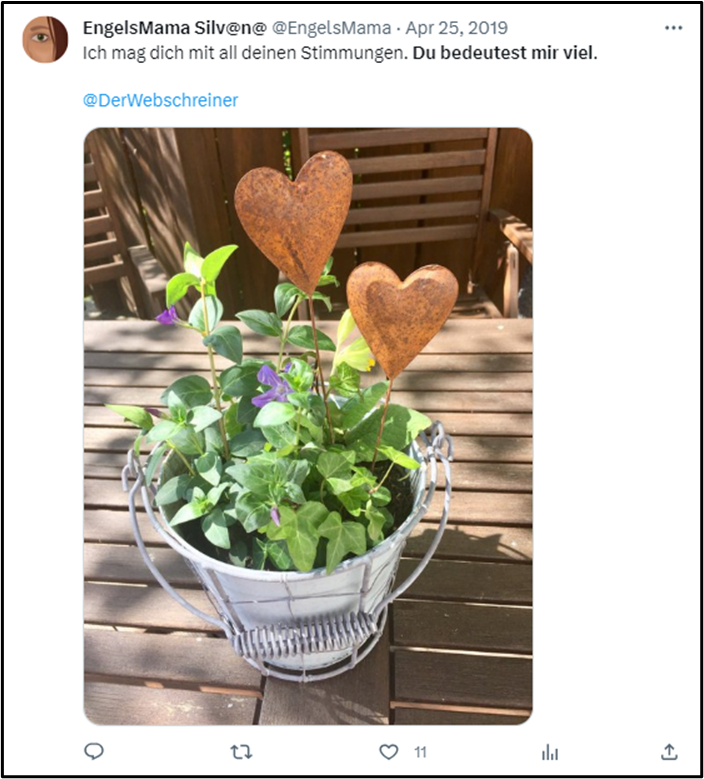
I like you with all your moods. You mean a lot to me.
@DerWebschreiner
„Du bedeutest mir viel!“ is used in German to show another person that they are of great emotional importance to oneself. This phrase indicates that the other person occupies an essential place in the life of the speaker.
Here are some contexts where you could say „Du bedeutest mir viel!“:
- In a friendship, to show that the common relationship is valued:
„Ich will, dass du das weißt: Du bedeutest mir viel." - In a romantic relationship to emphasize the importance of the partner:
„Es ist unglaublich, wie viel du mir bedeutest." - When wanting to thank someone who has always been supportive:
„Für all deine Hilfe und Unterstützung – du bedeutest mir viel." - In a moment when you want to express your deep feelings without saying „Ich liebe dich“:
„Vielleicht sag ich es nicht oft genug, aber du bedeutest mir wirklich viel." - When you want to express your feelings to a family member:
„Du bist nicht nur meine Schwester/Bruder, du bedeutest mir viel." - As comfort, to assure someone that they are not alone in difficult times:
„Ich bin da für dich, weil du mir viel bedeutest."
This expression is quite versatile and can be used in different types of relationships, whether among friends, within the family, or between partners. It is always a clear sign of a significant, valued connection.
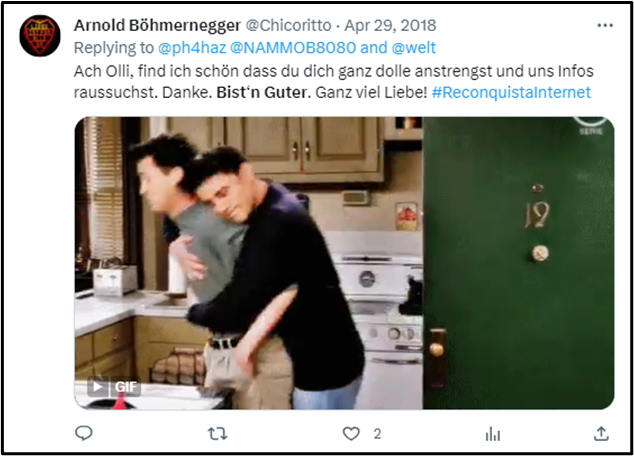
Oh Olli, I think it's great that you're trying so hard to find out information for us. Thanks. You're a good guy. Lots of love! ReconquistaInternet

Thank you Helga!! You are a good colleague AND friend!! It's great that you're there!
„Du bist'n Guter!“ or „Du bist 'ne Gute!“ is used in German to informally express recognition or commendation, where the version with „Guter“ is typically used for men and „Gute“ for women. It is often used to show that one views someone as a positive, reliable, or pleasant person.
Here are some situations in which one could use these expressions:
- When someone has provided assistance:
„Danke, dass du mir beim Lernen geholfen hast. Du bist 'n Guter!"
„Danke, dass du zugehört hast, als ich jemanden zum Reden brauchte. Du bist 'ne Gute!" - As a compliment for kindness or good deeds:
„Du hast den Obdachlosen etwas zu essen gekauft? Du bist 'n Guter!"
„Du hast das verlassene Kätzchen aufgenommen? Du bist 'ne Gute!" - As an expression of sympathy in a friendly relationship:
„Mit dir kann man echt über alles reden. Du bist 'n Guter!"
„Du bist immer für mich da. Du bist 'ne Gute!" - To appreciate the good performance of a colleague or team member:
„Super präsentiert heute bei der Arbeit! Du bist 'n Guter!"
„Du hast das Projekt perfekt abgeschlossen. Du bist 'ne Gute!" - In informal or relaxed situations to show that you appreciate the company of the other person:
„Es macht immer Spaß mit dir. Du bist 'n Guter!"
„Du bringst mich immer zum Lachen. Du bist 'ne Gute!" - For praise among friends or acquaintances when you want to highlight their character or actions positively:
„Du hältst immer, was du versprichst. Du bist 'n Guter!"
„Du stehst zu deinem Wort. Du bist 'ne Gute!"
It is important to note that both „Du bist'n Guter!“ and „Du bist 'ne Gute!“ are very colloquial and should be used in a correspondingly informal situation or in private circles.

I only go there because it's really around the corner and I can meet nice cosplayers and writers there. Which I otherwise only know from Twitter and Twitch. I would also like to thank you for your time and attention. You are really great.
„Du bist echt klasse!“ is used in German to express enthusiasm or great appreciation for a person and their actions, characteristics, or achievements. The phrase shows that you really appreciate someone and is applicable in both personal and professional contexts.
Here are some examples of situations where you could say „Du bist echt klasse!“:
- As a compliment after a special achievement:
„Das war echt nicht einfach! Aber du hast es geschafft. Du bist echt klasse!" - When someone stands out positively because of their behavior:
„Du bist immer hilfsbereit und geduldig. Du bist echt klasse!" - As recognition for social commitment or good deeds:
„Du setzt dich so für andere ein, das ist bewundernswert. Du bist echt klasse!" - To show a friend how much you value the friendship:
„Es ist immer so toll mit dir, du bist echt klasse!" - In appreciation of help or support in a difficult situation:
„Dass du für mich da warst, als ich dich gebraucht habe, macht dich zu einem klasse Menschen. Du bist echt klasse!" - In a sporting context, after a game or competition:
„Du hast heute auf dem Platz alles gegeben. Du bist echt klasse!"
The statement is very positively connoted and the word „echt“ reinforces the authenticity and honesty of the recognition.

“I’ve never been to this part of the castle before. Not when awake. I'm a sleepwalker... that's why I go to bed with shoes on." Oh Luna... you're really a sweetheart.
#Rewatching #HarryPotter and the Half-Blood Prince.
„Du bist echt ein Schatz!“ is a loving and heartfelt phrase in German often used in personal and close relationships to express the deepest appreciation and affection. It is suitable for situations where someone has been exceptionally kind, helpful, or understanding.
Here are some examples:
- When a person is always reliable and supportive:
„Du hast mir wieder so sehr geholfen – du bist echt ein Schatz!" - As an expression of gratitude to a partner:
„Du hast das alles ganz alleine für uns organisiert. Du bist echt ein Schatz!" - Towards family members to express love and affection:
„Du kümmerst dich immer so liebevoll um uns, du bist echt ein Schatz." - To praise a good friend who is always there when needed:
„Egal, wann ich dich rufe, du bist da. Du bist echt ein Schatz!" - To someone who made a small but significant gesture to bring joy:
„Du hast schon den ganzen Haushalt gemacht? Du bist echt ein Schatz!" - In recognition of empathy and compassion:
„Du hast immer ein offenes Ohr für die Probleme anderer. Du bist echt ein Schatz."
„Du bist echt ein Schatz!“ often expresses a high emotional appreciation and is typically used in contexts that are more personal and emotional than, for example, „Du bist echt klasse!".

With you one can steal horses = You are great sport #AmybethMcNulty #CdnScreenAwards
„Mit dir kann man Pferde stehlen“ is a German idiom used to express that someone is completely trusted and considered a loyal and daring companion in all kinds of situations. It means that you can go through thick and thin with this person.
Here are some examples of when to use it:
- When you want to describe especially close connection and reliability in a friendship:
„Du hast mir schon in so vielen Situationen den Rücken gestärkt. Mit dir kann man Pferde stehlen!" - To emphasize that you enjoy being with someone because they are up for any adventure:
„Mit deinem Mut und deiner positiven Einstellung kann man Pferde stehlen!" - As a compliment to someone always ready to try new and even risky ventures:
„Ob Geschäftsleben oder Freizeit, mit dir kann man Pferde stehlen." - In a loving context to show that you can face all challenges with your partner at your side:
„Mit dir an meiner Seite fühle ich mich bereit für jedes Abenteuer. Mit dir kann man Pferde stehlen." - When you want to tell someone how much you appreciate their fearlessness and support:
„Egal, wie verrückt die Idee ist, du bist dabei. Mit dir kann man Pferde stehlen!"
The phrase is very positive and emphasizes the strong mutual bond and the unconventional and sometimes challenging character of a friendship or relationship.

"I'm into you. Now lie down."
„Ich steh auf dich!“ is a colloquial German phrase used to indicate that you have romantic or physical attraction to someone. The phrase is relatively casual and direct but clearly expresses that more than just friendly feelings are involved.
Here are a few examples of when you could say „Ich steh auf dich!“:
- When you want to reveal your romantic affection to someone:
„Der Abend war echt toll! Und, ich muss dir einfach sagen: Ich steh auf dich!" - In a flirting situation to show interest:
„Du hast etwas an dir, das ich total mag. Ich steh auf dich." - When questioning an existing friendship because you've realized that you've developed deeper feelings for the person:
„Ich merke, dass das zwischen uns mehr ist als Freundschaft. Ich steh auf dich!" - When making a confession because you can no longer keep your feelings to yourself:
„Ich finde, es ist jetzt an der Zeit, ehrlich zu sein: Ich steh auf dich." - In the context of a shared activity or experience that has strengthened romantic interest:
„Nach dem heutigen Tag bin ich mir sicher: Ich steh auf dich!"
„Ich steh auf dich!“ is often used in a rather casual context and is a common way among younger people to show interest. It is less formal than a declaration of love and fits better in informal or casual situations. It is generally used when no sex has occurred and the „Beziehung“ has so far been merely friendly, but one can imagine more than just a friendship.

Congratulations.....despite the injury, despite the growth-related crisis, you shot 19 boxes in the first part of the preliminary round with lots of fun p1). My son the swiss topscorer.ch You're amazing! We football in peace <3
„Du bist der Hammer!“ is an informal German expression used to express enthusiastic recognition or admiration for a person or their performance. It resembles the English expressions "You're awesome!" or "You rock!" and demonstrates high appreciation.
Here are some examples:
- After an impressive performance:
„Wow, wie du das Problem gelöst hast – du bist der Hammer!" - As enthusiastic consent to an idea or action:
„Du hast uns allen freien Tag gegeben? Du bist der Hammer!" - To congratulate someone who has achieved something difficult:
„Du hast den Marathon in unter 3 Stunden geschafft? Du bist der Hammer!" - In response to good news someone shares:
„Du hast wirklich deinen Job gekündigt und gehst jetzt auf Weltreise? Du bist der Hammer!" - Acknowledgment for creative performance or artistic talent:
„Deine Zeichnungen sind einfach unglaublich. Du bist der Hammer!" - When someone shows strong commitment or helpfulness:
„Du hast die ganze Veranstaltung alleine organisiert? Du bist der Hammer!"
This phrase is very positive and often accompanied by genuine enthusiasm. It tends to be used in informal, relaxed contexts.

Congratulations on your Twitter anniversary
Without you it wouldn't be half as nice here!
„Ohne dich wär's hier nur halb so schön.“ is used in German to express that the presence of a certain person makes a situation, a place, or an event noticeably more pleasant or enjoyable. It highlights the positive impact that someone has on their environment or the ambiance.
Here are some examples of when you could say this phrase:
- At a gathering of friends to emphasize the importance of one person to the group:
„Es ist immer so lustig, wenn du da bist. Ohne dich wär's hier nur halb so schön." - In the professional environment, to show appreciation for a valued colleague:
„Dein Humor fehlt uns immer, wenn du im Urlaub bist. Ohne dich ist es hier nur halb so schön." - In a romantic relationship, to express your appreciation to your partner:
„Diese Aussicht ist wunderbar, aber ohne dich wär's hier nur halb so schön." - To thank someone who has enriched or supported an event:
„Dein Beitrag zum Fest war fantastisch. Ohne dich wär's hier nur halb so schön gewesen." - As a loving remark when someone realizes how important a particular person is in their own life:
„Seitdem du bei uns bist, ist alles viel schöner. Ohne dich wär's hier nur halb so schön."
This phrase can be used in a variety of contexts and is a nice compliment people like to hear because it shows them that they are appreciated and have a positive effect on others.
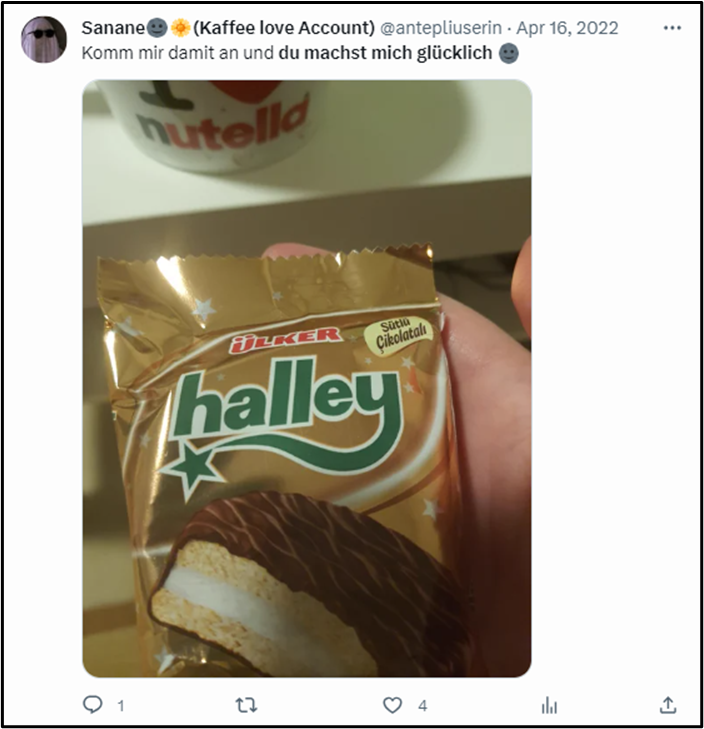
Give it to me and you'll make me happy
„Du machst mich glücklich!“ is a personal and emotional statement in German used to express that someone causes a feeling of happiness with their mere presence, actions, or words. This phrase is often found in intimate or close relationships but can also be used in a friendly or familial setting.
Here are some examples of its use:
- In a romantic relationship to show love and affection:
„Ich freue mich jedes Mal, wenn ich dich sehe! Du machst mich glücklich!" - As a token of gratitude to a supportive friend:
„Ich weiß deine Hilfe wirklich zu schätzen. Du machst mich glücklich." - To highlight the importance of a person in one's own life:
„Mit dir an meiner Seite fühle ich mich vollständig. Du machst mich glücklich." - In the family to show how important someone is for one's own well-being:
„Es ist so schön, dass wir uns haben. Du machst mich glücklich, Mama/Papa." - On special occasions or following a kind gesture:
„Das war so eine schöne Überraschung. Du machst mich glücklich!" - As an unspoken response to loving actions:
„Jedes Mal, wenn du mich zum Lachen bringst, erinnere ich mich daran, wie sehr du mich glücklich machst."
This statement is typically shared in positive and tender moments in order to clarify to another person the significance of their role in one's own emotional well-being.

@TheRealLiont you are my favorite person.
I am waiting for the day when I run to you crying and can hug you.
„Du bist mein Lieblingsmensch!“ is a loving expression in German used to tell someone that they are the most special and beloved among all the people one knows. It's about deep affection and high esteem for a person. You say this in moments when you want to highlight the uniqueness and importance of this person in your life.
Here are some situations where you can say „Du bist mein Lieblingsmensch!“:
- As an expression of strong affection in a partnership or friendship:
„Ich liebe es, Zeit mit dir zu verbringen. Du bist mein Lieblingsmensch!" - For birthdays or other holidays as a personal touch in a card or message:
„Alles Gute zum Geburtstag an meinen Lieblingsmenschen!" - In moments of happiness or gratitude, to emphasize how important the person is:
„Du hast meinen Tag gerettet – du bist wirklich mein Lieblingsmensch." - As part of a compliment when a person has done something special:
„Wie du das Problem gelöst hast, war großartig – du bist mein Lieblingsmensch!" - To show someone that they are always the first choice when it comes to making plans or activities:
„Mit niemandem gehe ich so gerne aus wie mit dir. Du bist mein Lieblingsmensch." - In a family context, to express special connectedness between siblings, children, or parents:
„Danke, dass du immer für mich da bist. Du bist mein Lieblingsmensch."
The expression is mostly reserved for private and emotional contexts, where you want to express feelings of love, friendship, and intimate connectedness.

Hey! Would you watch Titanic with me? Everything is better with you!
„Mit dir ist alles besser!“ is used in German to express that the presence of a person has a positive effect on one's mood or the quality of an experience. This phrase can be used in a variety of contexts and is often an emotional expression of appreciation.
Here are some typical situations where you can say „Mit dir ist alles besser!“:
- In a romantic relationship, to convey to the partner how important their presence is:
„Egal wie schlecht mein Tag war, wenn ich dich sehe, ist alles wieder gut. Mit dir ist alles besser!" - To express friendship and deep connection to a friend:
„Ganz gleich, was wir zusammen machen, es macht so viel mehr Spaß mit dir. Mit dir ist alles besser!" - During or after a difficult situation when someone realizes how much easier it has become through the support of another person:
„Ich hätte diese harte Zeit nie ohne dich überstanden. Mit dir ist alles besser." - In the family, to emphasize the importance of family support:
„Ob gemeinsames Essen oder Familienausflüge, mit dir ist alles besser!" - As a thank you to someone who has been helpful or provided consolation:
„Danke, dass du da bist. Mit dir ist alles besser."
This phrase is widespread in emotional and interpersonal contexts and indicates a deep personal connection and a high degree of emotional dependence on the other person.
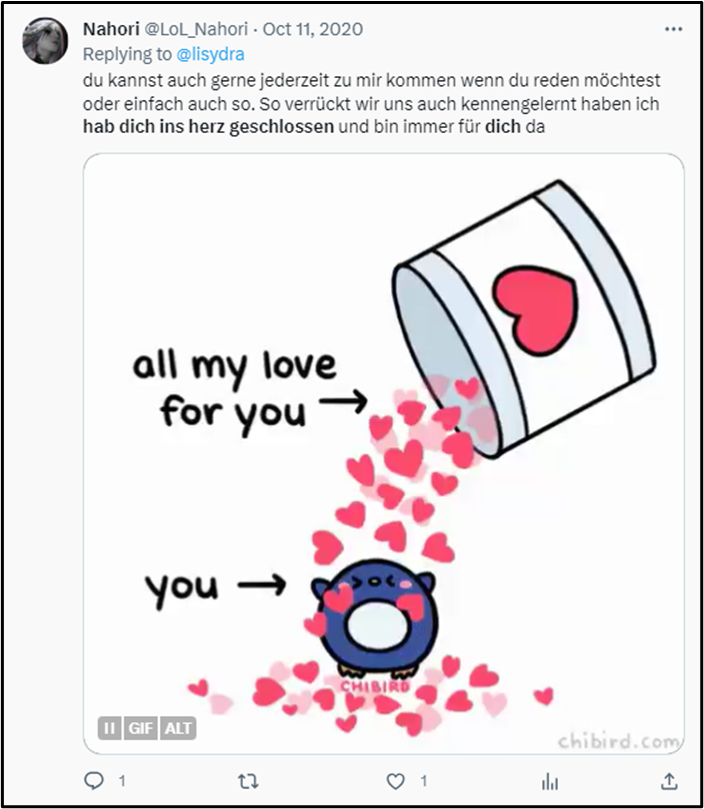
You are also welcome to come to me at any time if you want to talk or just like that. As crazy as we got to know each other, I have taken you to my heart and will always be there for you.
„Hab dich ins Herz geschlossen!“ is a warm-hearted declaration of feelings in German, which expresses that you have become very fond of someone and they hold a special place in your emotions. This phrase is typically used in situations where you want to express deep affection and emotional closeness to someone.
Here are some examples of when this expression might be appropriate:
- As an expression of friendship, when you want to tell someone how important they have become to you:
„Wir kennen uns noch nicht lange, aber ich hab dich ins Herz geschlossen." - Towards family members or close people to show love and closeness:
„Du bist zwar nicht blutsverwandt, aber ich hab dich ins Herz geschlossen." - At the end of an emotional conversation to clarify how much a person means to you:
„Nach allem, was wir geteilt haben, hab ich dich wirklich ins Herz geschlossen." - When you have to say goodbye to someone, whether because of a move, travel, or another life event, and want to express your feelings:
„Es fällt mir schwer, Tschüss zu sagen, denn ich hab dich ins Herz geschlossen." - As an emotional confession to someone who may not be aware of their importance in your own life:
„Vielleicht weißt du das nicht, aber ich hab dich ins Herz geschlossen."
This expression is usually reserved for personal and heartfelt relationships and is not used in a fleeting or superficial context. It implies a certain duration and intensity of positive feelings towards the other person.
Practice German Slang Now!
What can Slango do?
Slango helps you with all your questions about slang and informal language – fast, clear, and with translations and extra examples if you want. All in an easy, conversational style – perfect for fun, interactive, and motivating German learning!
Slango practices vocabulary with you and flexibly adapts to your level, so you can focus on what you really need.
You can get answers in multiple languages – German, English, Spanish, French, and more. That way, you can translate the words into your preferred language with ease.
You can access Slango anytime to ask questions or do exercises – no waiting required!

